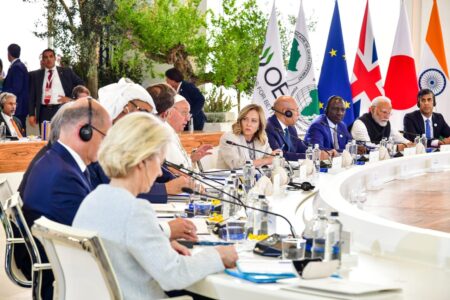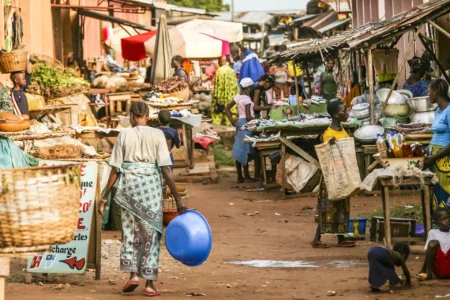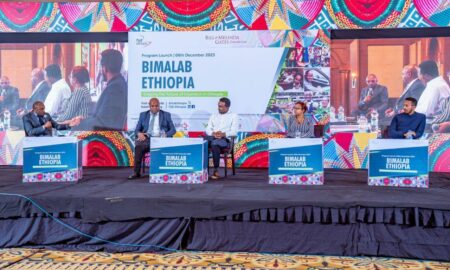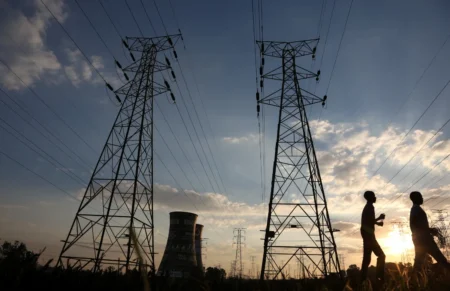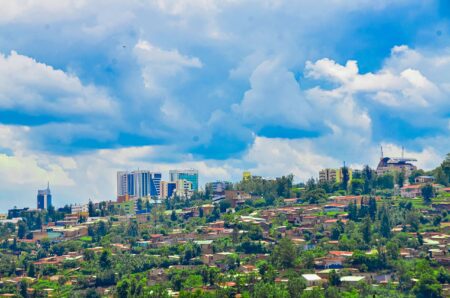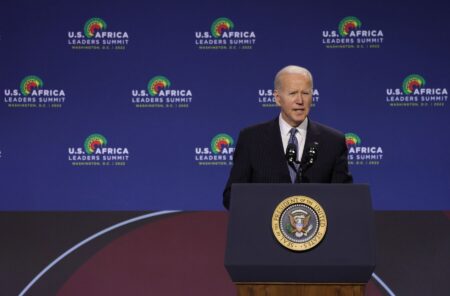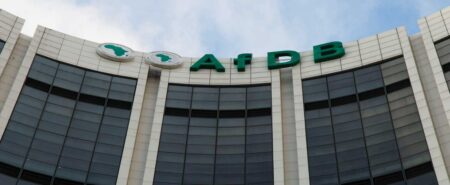- Africa’s new dawn: the rising role of digital and AI in agriculture
- Can Dangote Refinery Transform Africa Energy Ambition
- Gallup Survey: 80 per cent of Kenyan Workers Are Disengaged and Seek New Opportunities
- Madagascar Man Freed from 5KG Tumor After 15-Year Struggle
- How women in Africa are perceived and treated
- Sugar consumption in Kenya to Increase to 1.23 Million Tonnes
- Can Somalia and Turkey Oil deal Bring Change in Somaliland
- Remittances to Kenya dropped to $371.6 million in June, marking a six month low
Browsing: Africa
- President William Ruto of Kenya urges for reforms to the global financial system to provide Africa with access to long-term concessional finance and greater decision-making power.
- He highlights the critical need for investments in Africa’s infrastructure and clean energy projects to drive sustainable development and economic growth.
- The G7 Summit sought partnerships with African nations, aiming to bridge the continent’s infrastructure gap and support its development goals.
At the 50th G7 Summit held in Borgo Egnazia, Italy, President William Ruto of Kenya made a compelling case for the transformation of the global financial system to better serve Africa. Addressing an audience of world leaders, Ruto called for reforms that would grant the Global South, particularly Africa, access to long-term concessional finance and a greater voice in international decision-making processes.
“Reforming the multilateral global financial system is crucial for enabling Africa to access concessional, long-term, and agile finance,” Ruto emphasized. He …
- TLcom Capital has raised $154 million in its second Fund, TIDE Africa II
- With this second fund, TLcom Capital maintains its early-stage, multi-sector focus and expands its mandate beyond Sub-Saharan Africa to Egypt.
- TLcom Capital currently has over $300 million under management.
TLcom Capital, the Africa-focused venture capital firm, announced the final close of TIDE Africa Fund II, its second fund for technology in Africa, at $154 million. Confirming TLcom Capital’s status as Africa’s largest Seed and Series A investor, the new fund accelerates the firm’s mission to partner with elite founders to tackle Africa’s biggest and most complex challenges with innovative solutions that will unlock massive value in the continent’s critical sectors.
At more than twice the size of TLcom Capital’s first fund, TIDE Africa Fund II is oversubscribed and sees participation from several new, high-profile LPs alongside returning LPs from the firm’s first Africa-focused fund, TIDE Africa Fund …
- Africa’s agribusiness sector is undergoing significant transformations driven by population growth, urbanisation, technological advancements, and shifting consumer preferences.
- Alongside their role in stimulating economic growth, agribusiness and agro-industrial development have the potential to reduce poverty and foster social and economic growth.
- Technological advancements and digital transformations are revolutionising agribusiness in Africa, offering transformative opportunities.
Africa’s agribusiness sector potential
Agribusiness in Africa is undergoing significant transformations driven by population growth, urbanisation, technological advancements, and shifting consumer preferences. As a continent with abundant agricultural resources, Africa holds immense potential for agribusiness development.
African economic growth remains commodity-based, mainly on commodity exports, with minimal processing and value addition involved. To foster sustainable and inclusive growth and development in Africa, there is an urgent need to promote a new development approach based on exploiting the continent’s full agribusiness potential.
Some pressing issues call for a reorientation to support agribusiness and agro-industrial development, namely, poverty …
- Following a slow recovery from the debilitating impact of COVID-19, Africa’s economic growth declined to an estimated 3.8 per cent in 2022 and later deteriorated to 3. (https://rescueresponse.com) 3 per cent in 2023.
- Africa is not immune to economic shocks and has recently faced a multi-crisis situation.
- African countries have posted more than 5 per cent output expansions in 2024.
Africas economic outlook
Before COVID-19, Africa experienced 20 years of solid growth and made tangible economic and social progress. However, the COVID crisis brought this progress to an abrupt halt, and many countries, which are under increasingly tight budget constraints, struggled to invest in essential sectors amidst recovering from the aftermath of the health crisis.
Following a slow recovery from the debilitating impact of COVID-19, Africa’s economic growth declined to an estimated 3.8 per cent in 2022 and later deteriorated to 3.3 per cent in 2023.
However, according …
- The Bimalab Africa program is an innovation that brings together insurance innovators, technology partners, insurance firms, investors, and regulators.
- BimaLab Africa will expand its footprint to accelerate 55 insurtechs in 15 African countries.
- The initiative is dedicated to tackling pressing issues such as climate change, health, and gender disparities in the sector.
The Bimalab Africa Insurtech accelerator program has received $600,000 (about KSh85.9 million) in funding to expand its operations across Africa. Following the fresh financing round by the Swiss Re Foundation, the program is now set to grow to cover 15 countries across the African continent from the initial 10 countries covered in the 2023 program.
The program offers hands-on venture-building support to high-impact Insurtech start-ups that improve the resilience of underserved and climate-vulnerable communities.
The initiative is dedicated to tackling pressing issues such as climate change, health, and gender disparities while also addressing the challenges micro, small, …
- Ransomware Attacks and backdoors are the leading threats Kenyans contend with
- According to the CAK, Kenya experienced 860 million cyberattacks in 2022–2023.
- Check Point Research has also identified ransomware Attacks among the first rising in Africa.
Kenya was the second most attacked country by cybercriminals in the Middle East, Turkey, and Africa region (META), according to new data released by cybersecurity solutions provider Kaspersky.
Only Turkey recorded the highest number of attacks among the 12 countries in the META region. The region comprises Bahrain, Egypt, Kenya, Kuwait, Nigeria, Qatar, South Africa, Saudi Arabia, Turkey, UAE, Oman, and Pakistan.keyvone lee jersey yeezy boost 350 v2 hyperspace sac eastpak custom youth hockey jerseys jock strap custom sublimated hockey jerseys jock strap johnny manziel jersey nike air jordan 1 elevate low brock purdy jersey brock bowers jersey college football jerseys air max 270 women custom youth hockey jerseys custom dallas stars …
- Africa’s low electricity access stresses the need to double more than the efforts to meet SGD 7.1 by 2030.
- In Kenya, data by the lender shows 71 per cent of the population had access to electricity in 2021, compared to about 14 per cent in 2000.
- World Bank further identifies a stark divide in global access to electricity between urban and rural areas.
Sub-Saharan African states have made tremendous progress in electricity access in the past two decades, with the access rate rising from 25 per cent in 2000 to 48 per cent in 2020.
However, according to the World Bank, countries must double their electrification efforts to bring electricity to all by 2030, meeting Sustainable Development Goal Seven.
“Global access to electricity is increasing at a slow pace, with the progress towards achieving universal access to electricity being slow over the last 20 years,” …
Africa will be the second fastest-growing regional economy in 2024. Over 10 African countries will experience substantial GDP growth. In October 2024, the International Monetary Fund emphasized Africa’s pivotal role in global economic development and resilience.
Africa could face economic headwinds this year. However, some of the continent’s brightest spots are lighting up the economic prospects. According to the International Monetary Fund, six of the top 10 performing nations globally are projected to come from Africa in 2024.…
- Continuing from the discussion of evolving US-Africa trade relations, a key aspect of this dynamic is the strategic objective of countering Chinese influence on the continent.
- By 2024, Africa is poised to undergo a significant shift in geopolitical and economic dynamics, emerging as a crucial arena for global powers such as China and the US.
- The evolving focus on Africa is driven by its transforming economic landscape, marked by rapid growth, a youthful population, and abundant resources, attracting attention from major players seeking strategic advantages.
By 2024, Africa will have witnessed the beginning of a new age in the geopolitical and economic dynamics of the world. In recent years, the continent has shifted its focus from humanitarian issues and developmental assistance to becoming an important strategic arena for the world’s leading powers, particularly China and the US. Several elements are coming together to highlight Africa’s growing importance internationally, driving this …
- An ongoing diplomatic row in Addis Ababa has prompted the AfDB to withdraw its international expatriates from Ethiopia.
- At the same time, fears of a possible shift of the African Union’s (AU) headquarters from Addis Ababa to Nairobi have been voiced in response to the worsening political situation and growing violence in Ethiopia.
- The current scenario in Ethiopia presents significant obstacles for international organizations that operate within the country.
Circumstances surrounding the AfDB’s withdrawal from Ethiopia
A roiling diplomatic crisis pitting the African Development Bank (AfDB) against authorities in Addis Ababa—the seat of the African Union—has prompted the pan-African lender to relocate its international personnel from Ethiopia in a huff. This hasty decision announced on Wednesday comes months after Ethiopian security forces reportedly mistreated two AfDB staff members in Addis Ababa on October 31, 2023.
Under the direction of a newly designated Officer-in-Charge, the Bank’s Ethiopian office will continue to …





